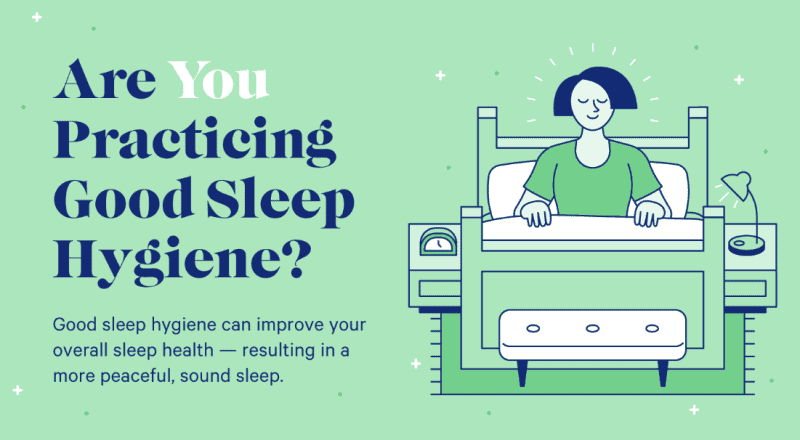Sleep hygiene is the practice of following behavioral and environmental habits to improve sleep quality and daytime alertness.
An important component of good sleep hygiene is making sure you’re sleeping enough.
On average, 7 hours of sleep each night is recommended for adults.
If you find that you struggle to get enough hours, try adopting these 12 tips into your routine.
1. Get Some Sunshine
Once you wake up, you should let your body soak up the natural light.
This habit can reset your circadian rhythm and tell your brain to start working.
A walk outside first thing is a great way to do this and achieve a much-needed energy boost.
If you are short on time, open your window shades or turn lights inside.
2. Stay Active
20-30 minutes of physical activity daily can help you fall asleep at night.
Being active can also decrease the frequency of waking up each night.
Be sure to avoid strenuous exercise one to two hours before bed since it raises your heart rate and makes it harder to fall asleep.
3. Reduce Nap Frequency
20-minute naps or longer can cause “sleep inertia”.
This is the feeling of grogginess after waking up.
This feeling can last up to four hours, which can greatly impact your day.
Avoid the urge to nap during that afternoon slump and go for a walk outside or eat a healthy snack instead.
4. Skip Alcohol Before Bed
Alcohol may make you sleepy at first but you’ll find yourself waking up more frequently throughout the night. It also has the ability to cause symptoms of insomnia.
Before you drink wine, swap it with warm milk or chamomile tea which are sleep-inducing drinks.
5. Lower the Temperature
For adults, the best temperature for sleep is between 60 and 67 degrees Fahrenheit.
You can adjust the temperature to what feels best for you, but chillier temperatures are usually better for sleep. Also, the darker your bedroom is the better.
Consider a sleep mask to ensure your sleep goes uninterrupted if you have a partner who likes to read with light.
6. Keep Your Schedule on Track
Sleep irregularity can result in a hard time falling asleep, a decrease in energy levels and stress. Setting a consistent bedtime can help you get back on track.
Remember to set a regular wake up time as well.
7. Turn off Electronics
Exposure to blue light from electronics can affect your circadian rhythm.
It can also lower your natural melatonin levels — negatively affecting sleep quality.
Make a rule to shut off all electronics before sleeping and pick up a relaxing activity, such as meditation or reading.
8. Reserve the Bedroom for Intimacy and Sleep
Activities in the bedroom other than intimacy and sleep can cause your mind to link those things with sleep.
For example, if your work from home office is your bed, your mind may start to think of work when you’re trying to fall sleep, causing stress.
To solve this, keep the bedroom for sleep and intimacy only.
9. Lower Surrounding Noise
Similar to how temperature and light can make it hard to fall asleep, so does noise.
Nocturnal noise disturbances directly correlate to impaired sleep — even if the noise wakes you up or not.
To combat this, try using earplugs or listening to meditative music.
10. Resist Late Snacking
Bedtime snacks are said to have negative effects on sleep and can result in things such as nightmares, insomnia, or weight gain.
Be sure to stop eating two to three hours before you go to bed.
11. Stay Positive
There is nothing worse than anxiety when you sleep. This can lead to an endless cycle of poor sleep.
If you experience this on a daily basis, try meditating.
Meditation makes it easier to fall asleep and improves overall sleep quality.
If that doesn’t work, try yoga as an alternative.
12. Don’t Force It
Forcing sleep on your mind will create more anxiety and will only make it harder for you to fall asleep.
After 20 minutes if you can’t fall asleep, leave your bedroom and try to distract and calm yourself by doing something else like make a cup of tea or meditate.
Once you find yourself tired again, go back to bed and easily fall asleep.
Check out Casper’s infographic to make these tips a habit!






